Yingkou, Liaoning province, processes 3 billion yuan of the invertebrate, employs 50,000 people
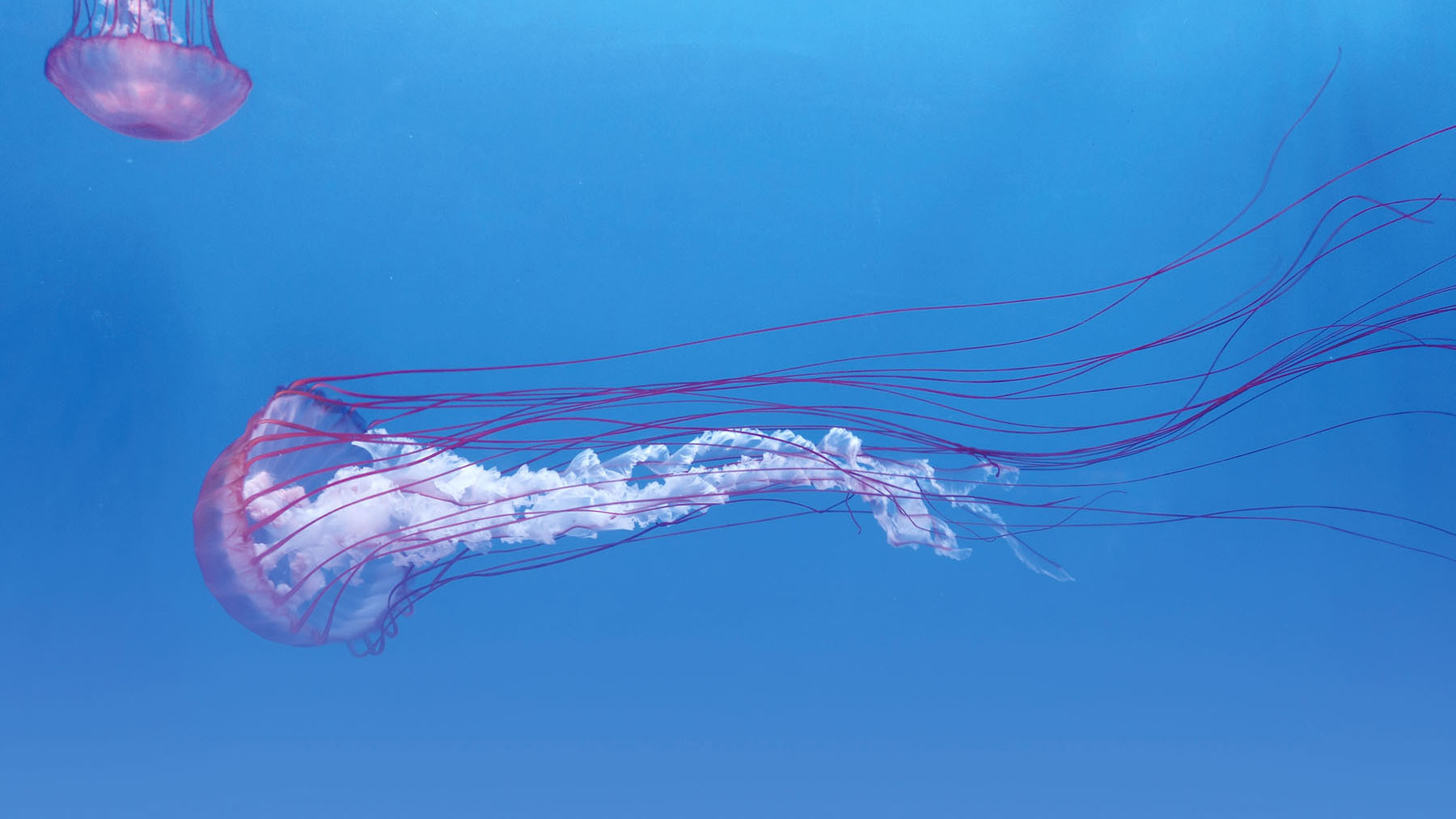
Editor's Note: In a series of reports titled "Claims to Fame", China Daily looks at how some regions have earned wealth and recognition through specific products to realize the goal of development.
Feared by some for its ghostly appearance and toxic tentacles, and loved by others as a tasty treat, the jellyfish is generating currents of wealth for a city in Northeast China.
Fishermen in Yingkou, Liaoning province, have conquered concerns about the marine creature's toxic tentacles and frightening image to bring it to a growing number of dinner tables in China and overseas.
"When we go fishing we wear leather suits and leather gloves," said Wang Mingke, a fisherman from Yuye village, Bayuquan district, Yingkou, who has caught jellyfish for about 30 years. "Upon returning, we unload the jellyfish using the water tank on the boat. Protective measures are taken throughout the process."
READ MORE: Artist creates a paper trail to the imagination
Wang said he's not concerned about the threat of jellyfish stings that leave lacerations on a victim's skin, but are mostly nonlethal to humans.
"In case of a sting, I apply alum (an astringent that draws out fluids) to the affected skin and then rinse it with clean water. Generally speaking, we fishermen don't usually have big problems at sea," he said.
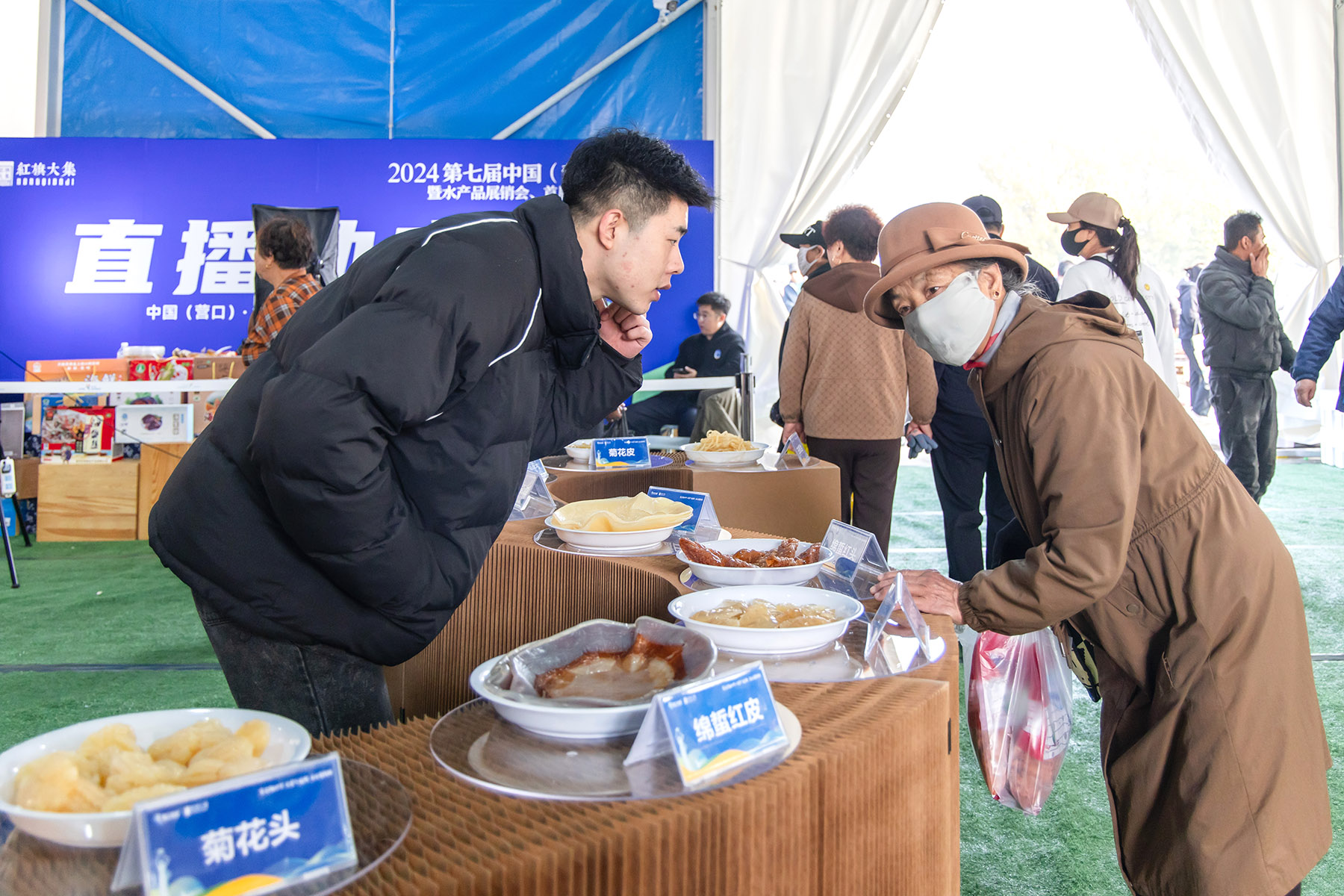
Bountiful bay
Since 1989, Yingkou has become famous for fishing and processing jellyfish. The techniques have been passed down through different generations, as demand for the delicacy has spread across the world.
The country's largest jellyfish breeding, processing and trading area, in 2019 the city was named the "hometown of Chinese jellyfish" by the China Fisheries Association.
Situated at the mouth of the Daliao River next to the Bohai Sea, Yingkou has mild sunlight and abundant plankton, one of the main food sources for jellyfish, along with small fish, crustaceans and mollusks. With 1,507 square kilometers of sea, the city's marine area naturally produces 400 million jellyfish annually.
The artificial breeding area of jellyfish is about 55,000 mu (3,666 hectares), with 8,000 metric tons of jellyfish cultivated on average every year. This year, the total jellyfish catch reached 206,000 tons, a 20 percent increase from previous years, data from local authorities showed.
Jellyfish are usually caught in July and August.
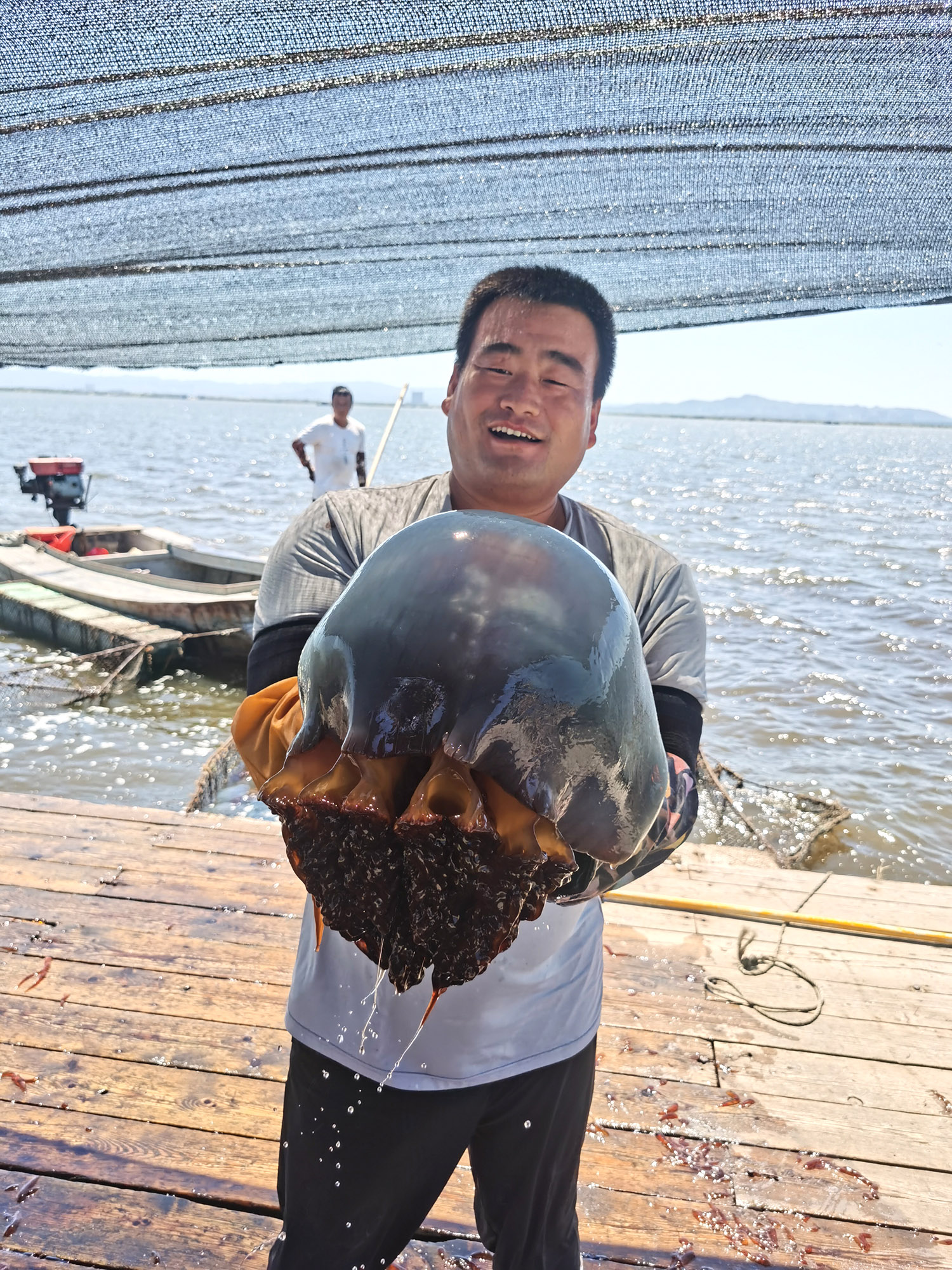
Every year at Wanghaizhai pier, about a dozen small plants process them after they are taken off the trawlers, Wang said. "We sell jellyfish to them, and some of the products are exported to neighboring countries," he said.
Wang believes catching jellyfish is good for marine ecology, as "fish, shrimps and crabs may be numbed or killed by the venom of the jellyfish".
Wu Jiacheng, an official from the city's bureau of ocean and fisheries, said the potential of the jellyfish industry in Yingkou is enormous.
"On the supply side, Yingkou has unique advantages in natural resources. Coupled with the development of artificial cultivation, the supply is abundant and sustainable," he said. "On the demand side, jellyfish is rich in collagen. Its low calorie and high nutritional content is increasingly favored by consumers."
Yingkou has established a complete industry chain integrating cultivation, fishing, processing and trade, and is transitioning toward deep processing and branding.
"With the integrated development of agriculture, fishing and tourism, the added value of the jellyfish industry will be further enhanced," Wu said.
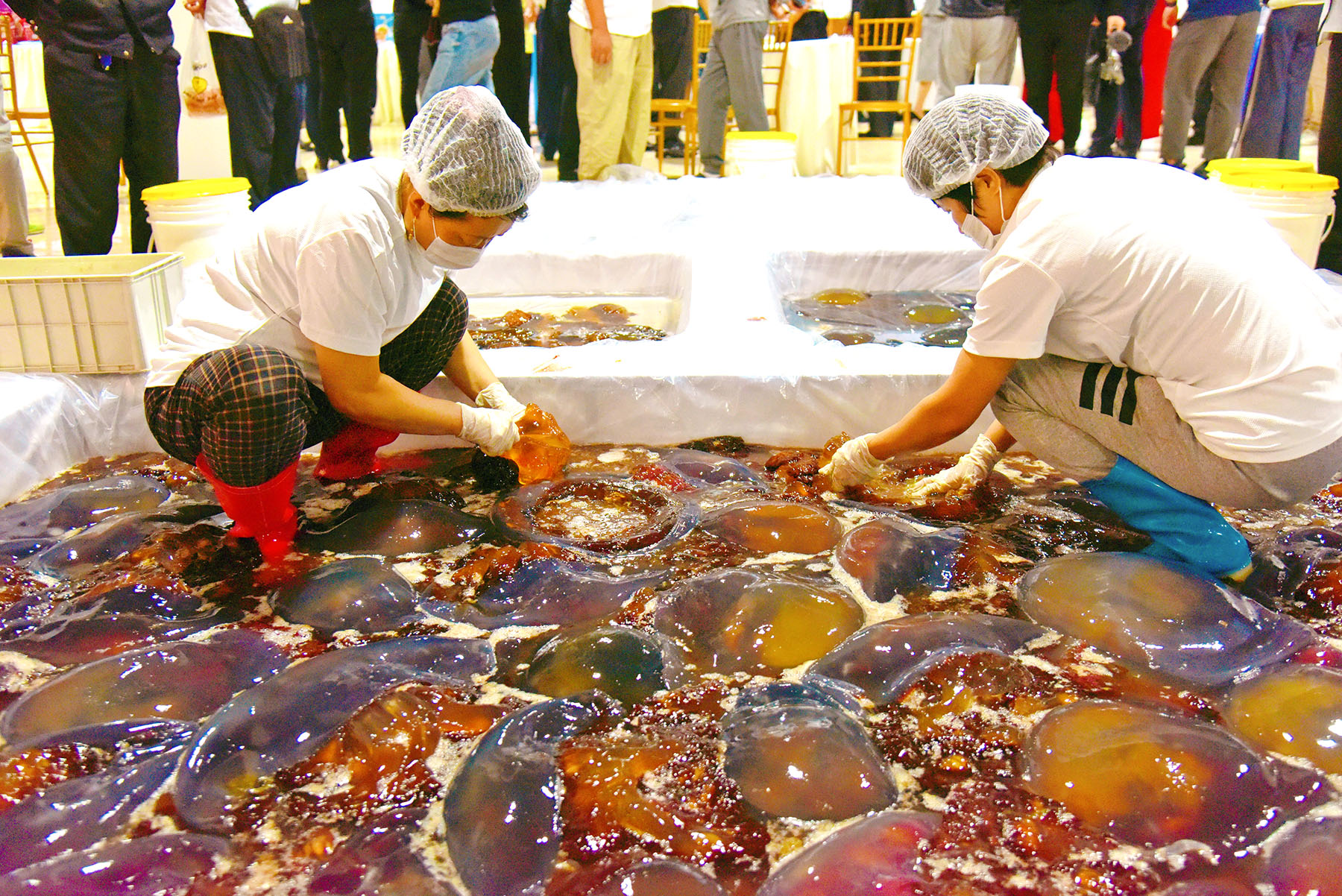
Detoxifying
The complex processing of jellyfish, which importantly involves removing the toxins, has laid the foundation for the industry to prosper in Yingkou.
Chen Dehui, head of the Gaizhou Yinghui Aquatic Products Processing Factory, one of the city's major jellyfish processors, is an expert in the field.
The first step is to separate the skin and the bell, the umbrella-like body of the jellyfish, Chen said.
"The second step involves removing the toxins, which is typically achieved by adding water to allow the jellyfish to decompose at around 25 C. This process generates bacteria that can control jellyfish toxins. This is followed by rinsing with clean water," he said.
After washing the jellyfish, they are treated with alum to further detoxify them, which usually takes 12 to 24 hours.
Edible salt is used for preservation. For every 50 kilograms of jellyfish, at least 10 kg of salt are required. After being in brine for 72 hours, the jellyfish are ready for sale, Chen said.
Processing a jellyfish needs perfect timing. Since 95 percent of the creature is water, it can evaporate in sunlight.
Chen's company sends fleets to the Bohai Sea every mid-August to net mature jellyfish older than 80 days. It has a dock operation for the segmentation, slicing and salting of jellyfish. The workers use large water pumps to transport seawater for cleaning and to also keep the jellyfish fresh.
Tao Guofeng, chairman of Yingkou Chenguang Sea Product Co, said jellyfish are the most difficult aquatic product to process.
"A jellyfish contains water-soluble proteins. If it is only salted, it will become smelly. It needs to be combined with alum, and the processing is influenced by factors such as temperature, the season, and environment, with varying proportions of salt and alum used," he said.
The company has developed advanced techniques that enable jellyfish to be processed in one day. A shelf life of more than six months without preservatives or additives can be achieved, but "it requires high standards for equipment and workshops, leading to higher costs", Tao said.
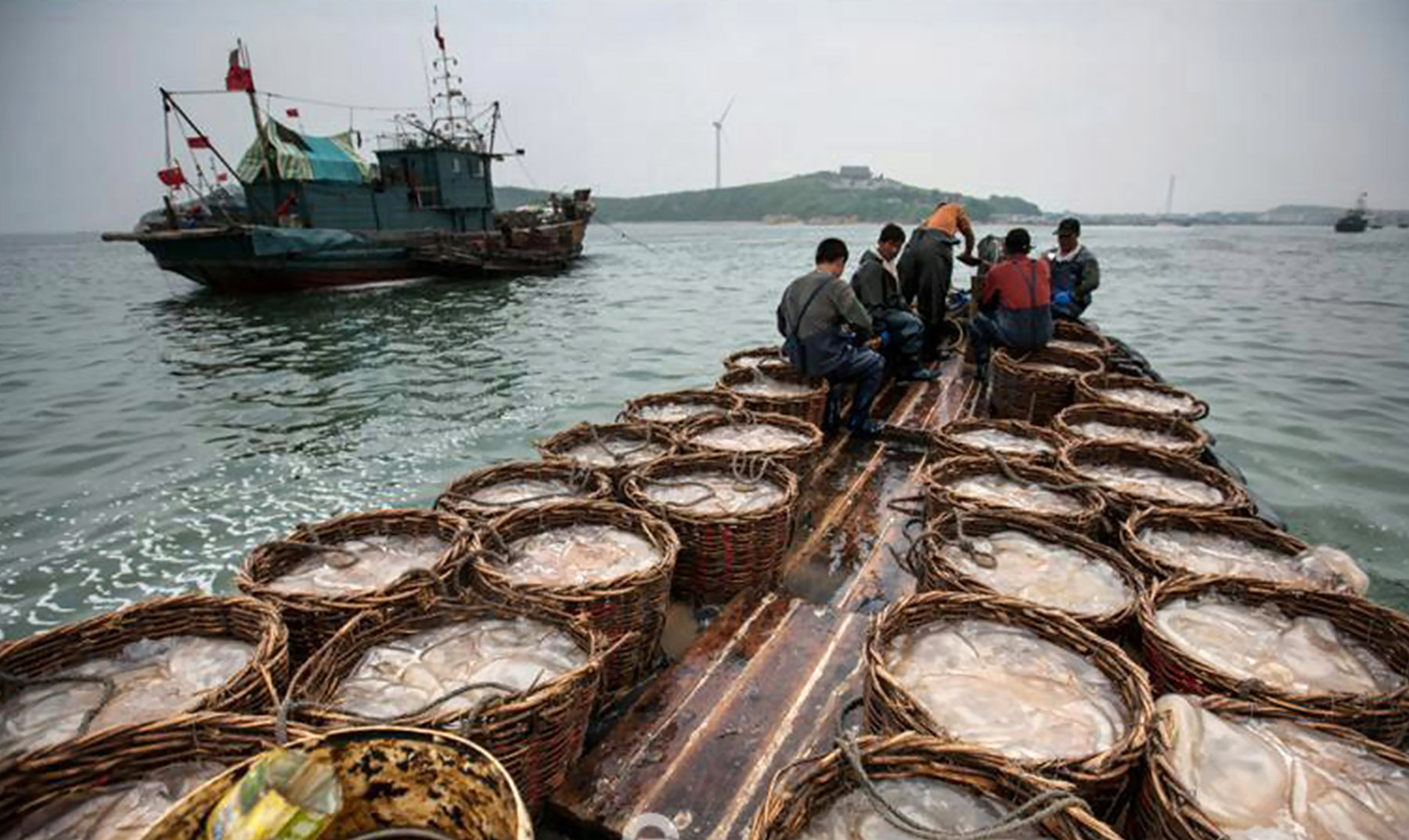
Business spreads
Yingkou has more than 300 processing companies, family workshops and cooperatives employing around 50,000 people in jellyfish-related work.
Each year the city produces on average 236,000 tons of processed jellyfish, with about 81 percent of the raw material coming from outside the city. The total output value of jellyfish processing is approximately 3 billion yuan ($413 million), data from local authorities showed.
Yingkou exports about 12,000 tons of jellyfish to 33 countries and regions annually, mainly to Japan, South Korea, the United States, and European countries.
Gaizhou Yinghui Aquatic Products Processing Factory processes 4.1 million kg of jellyfish every year. Half of the amount is exported, while the other half is made into precooked food for domestic farmers' markets and hotels, according to Chen.
"Our Yingkou jellyfish, with high-quality standards and traditional processing techniques, quickly gained favor among domestic and foreign customers, creating substantial wealth for people," he said.
"High-quality jellyfish can promote digestion and slow down aging, and is food that supports the health of middle-aged and elderly people," he said, adding he expects both demand and markets to expand in the future.
"Jellyfish processing does not cause any pollution. This industry can last for thousands of years with proper guidance from the government," he said.
Tao Siqing, general manager of Yingkou Chenguang Sea Product Co, said that in the past the company's focus was on quantity. Now, it relies on proper decomposing of the jellyfish, and deep processing, to ensure the quality of its products and the success of its brand, she said.
Founded in 1997, Chenguang has built advanced production lines and obtained multiple international certifications for the quality of its goods from the United States, Canada and the European Union. It has made breakthroughs in the development of innovative products such as instant jellyfish.
Tao Guofeng, the company's chairman, said jellyfish existed before the dinosaurs. "As long as the ocean exists, jellyfish will survive, and as long as there are jellyfish, humans will eat them," he said.
In 2014, Yingkou Jellyfish was recognized as a national geographical indication product, and a top 10 fishery brand of Liaoning.
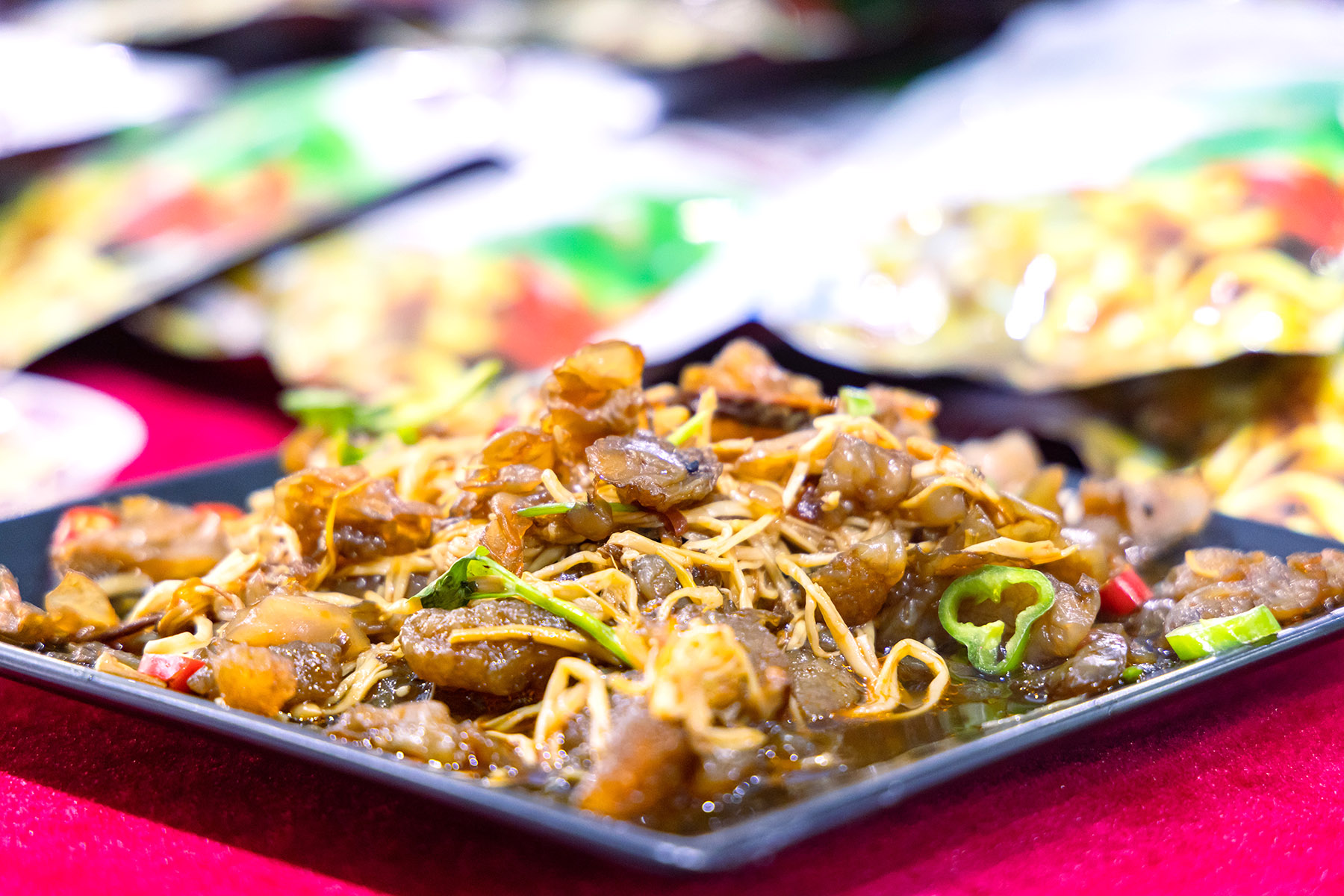
Government efforts
Enhanced efforts are being taken by the Yingkou government to develop the jellyfish industry while maintaining sustainable development of the maritime environment.
Modern technologies, such as satellite positioning systems and drones to monitor fishing vessels in real time, ensure that fishing activities are conducted within specified times, areas and quotas, said Shu Shi, deputy director of the bureau of ocean and fisheries of Bayuquan district.
"We also ask fishermen to use proper fishing equipment and methods to minimize the impact on marine creatures," Shu said, adding that commercial fishing of the invertebrate is good for marine environments.
"A rapid increase in jellyfish numbers may directly put pressure on biodiversity and the ecological balance," he said. "During their growth and reproduction, jellyfish can generate a significant amount of biomass, whose decomposition may deplete oxygen in the water, causing deterioration of water quality. The death and decay of jellyfish can release harmful substances, further affecting water quality."
The city also breeds jellyfish to meet market demand. Since 2020, it has released 520 million jellyfish larvae.
This has played a vital role in the recovery of jellyfish resources and also increased fishermen's income, according to Yang Zhuo, an official from Yingkou's publicity department.
In 2024, with an investment of 2 million yuan, the city released 70 million jellyfish larvae.
Since 2018, the city has hosted an annual jellyfish festival to attract investment and promote the opening-up of aquaculture. It also organizes for companies involved in the industry to attend large fisheries exhibitions and sales fairs in other provinces to seek business opportunities.
In recent years, the revenue from jellyfish processing companies saw a decline because of the COVID-19 pandemic and downward pressure on the global economy. The city is exploring ways to boost domestic demands, such as the promotion of hot pot jellyfish in Chongqing, Sichuan province and Guangdong province, said Yang.
The local government is also encouraging companies to improve deep-processing techniques, innovate in developing new products such as multiple-flavor instant food, and expand online selling channels.
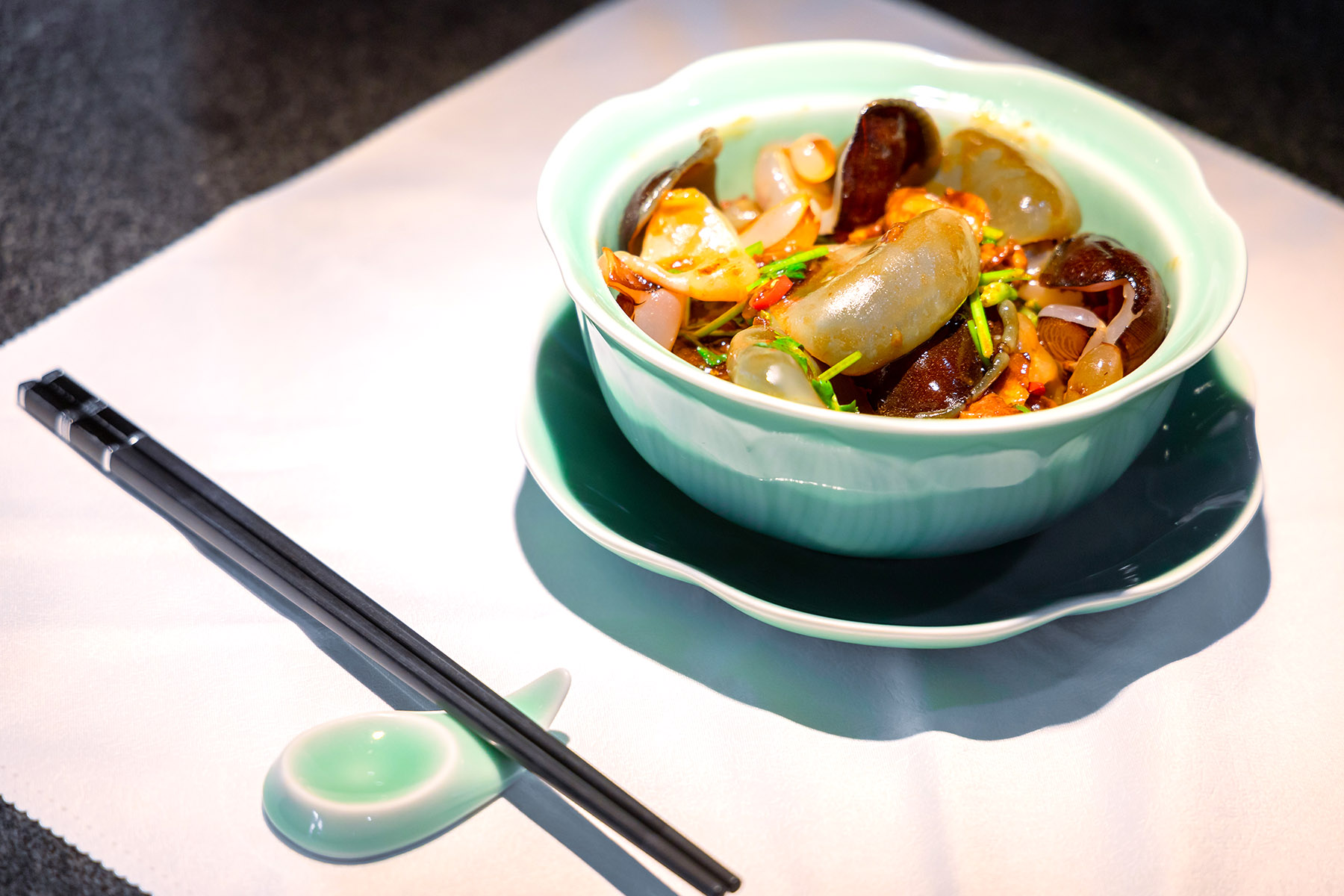
Nutritional value
According to the Compendium of Materia Medica, an encyclopedic work of herbology and nature compiled by Li Shizhen in the Ming Dynasty (1368-1644), jellyfish has the effects of "clearing heat, detoxifying, resolving phlegm, lowering blood pressure and reducing swelling".
Every 100 grams of jellyfish contains 12.3 grams of protein, as well as being rich in calcium, iodine and various vitamins.
The late Hong Huixin, a renowned fisheries expert and jellyfish researcher, wrote that the nutritional value of jellyfish exceeds that of sea cucumbers.
"Essential amino acids for the human body account for 29.3 percent of the total amino acids in jellyfish, which is higher than the proportion in sea cucumbers at 23.9 percent," he wrote. Essential amino acids are ones the human body cannot synthesize on its own and must obtain from food.
ALSO READ: Water diversion project brings benefits to east China
While it has strong nutritional benefits, some diners simply enjoy fresh jellyfish for the taste.
"Jellyfish is tender and refreshing, rich in collagen, loved by the elderly and children. My family eats jellyfish once or twice a week, especially in the summer," said Sun Hui, a Yingkou resident.
Her most common dish is a cold salad, made by "slicing the jellyfish into shreds and adding minced garlic, corianda, vinegar — simple and appetizing", she added.
Liu Jun, another resident, said jellyfish is a special gift he takes when visiting friends and relatives.
"The ready-to-eat packages are convenient to carry, with prices ranging from tens to hundreds of yuan," Liu said.
Liu Shicheng contributed to this story.
Contact the writers at chenmeiling@chinadaily.com.cn


